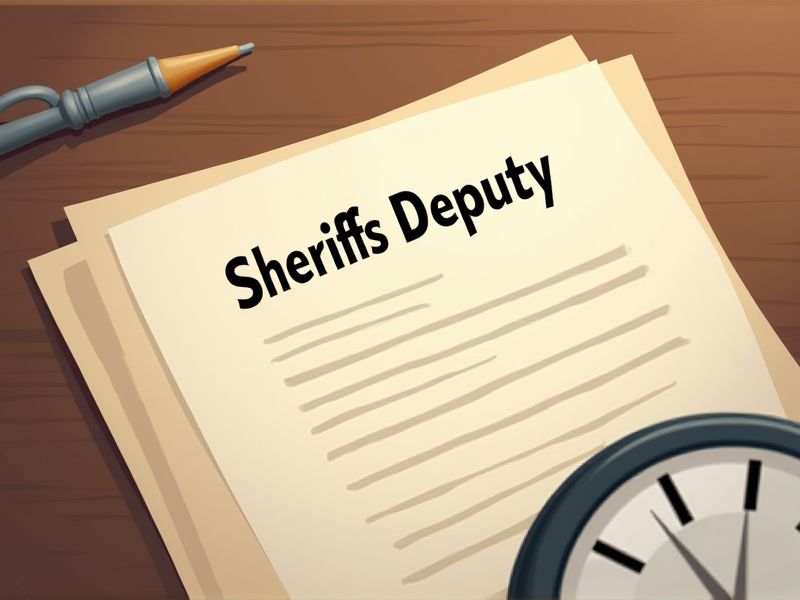
Sheriffs deputies require specific certifications to ensure they possess the necessary skills for law enforcement duties. Certifications validate a deputy's knowledge in areas like firearms use, emergency response, and legal procedures, which are critical to maintaining public safety. Moreover, proper certification ensures deputies are aligned with departmental standards and state regulations, which is vital for effective community policing. Here are some key certifications that may be essential for a Sheriff's Deputy.
POST Basic Law Enforcement Certification
The POST Basic Law Enforcement Certification ensures that a Sheriff's Deputy has met established standards for competency and skills necessary for law enforcement duties. This certification enhances the credibility and professionalism of the deputy, fostering public trust and confidence. Meeting POST standards often includes rigorous training and examinations, which prepare deputies for real-world situations they may encounter. Without this certification, a deputy may lack the requisite knowledge and abilities to safely and effectively serve their community.
Firearms Proficiency Certification
Firearms proficiency certification ensures that a Sheriff's Deputy is capable of handling weapons safely and responsibly, thereby reducing accidental discharges and enhancing public safety. Certification enhances the officer's confidence in high-pressure situations, leading to better decision-making during encounters involving firearms. Consistent training and assessment in firearms proficiency can increase an officer's accuracy, thus minimizing collateral damage during critical incidents. This certification is often mandated to meet legal and department standards, maintaining the legitimacy and trust of law enforcement agencies in the eyes of the public.
Defensive Tactics Certification
Defensive Tactics Certification ensures that sheriff's deputies can effectively handle confrontations, minimizing injury risk. This certification provides deputies with techniques to de-escalate potentially violent situations, maintaining public safety. It enhances a deputy's confidence and decision-making in high-pressure scenarios. Certification acts as a benchmark for continual assessment of skills in line with evolving law enforcement challenges.
Emergency Vehicle Operation Course Certification
The Emergency Vehicle Operation Course Certification ensures Sheriffs Deputies possess the necessary skills to operate vehicles safely during high-stress situations. Proper training reduces the likelihood of accidents, protecting both the deputies and the public. States generally require this certification to comply with legal standards, mitigating liability risks for law enforcement agencies. Training also prepares deputies for rapid response scenarios, enhancing their effectiveness in critical operations.
CPR and First Aid Certification
CPR and First Aid Certification equips a Sheriff's Deputy with essential lifesaving skills, enhancing their readiness in emergencies. A certified deputy can quickly respond to medical incidents, potentially saving lives before paramedics arrive. Certification ensures deputies meet mandated safety standards, reinforcing public trust in their capabilities. Training in CPR and First Aid can decrease liability risks for law enforcement agencies by demonstrating preparedness and competence.
Crisis Intervention Certification
Crisis Intervention Certification enables a sheriff's deputy to effectively handle behavioral health crises. Advanced training reduces the risk of escalation and enhances safety for both officers and the community. This certification equips deputies with tools to identify mental health issues, ensuring appropriate responses and referrals. Enhanced communication and de-escalation skills foster stronger community trust and relations.
Use of Force Certification
The Use of Force Certification ensures that a Sheriff's Deputy is trained to handle situations with appropriate and lawful force, reducing the risk of harm to the public and themselves. By obtaining this certification, deputies demonstrate a clear understanding of departmental policies and legal standards, thus minimizing potential liability for the department and the municipality. Proper training through certification can lead to better decision-making in the field, decreasing incidents of excessive force and promoting community trust. The certification process often involves scenario-based training, which equips deputies to manage high-pressure situations efficiently and ethically.
Community Policing Certification
Community Policing Certification enhances a Sheriff's Deputy's ability to build trust and collaboration with the public, leading to more effective crime prevention. The certification provides deputies with essential skills in conflict resolution and cultural competency, thus enabling better handling of diverse community needs. With focused training, deputies can utilize proactive policing strategies that address the root causes of criminal behavior. The certification aligns with best practices for transparent and accountable law enforcement, essential for maintaining legitimacy and public confidence.
Criminal Investigations Certification
Obtaining Criminal Investigations Certification equips a Sheriff's Deputy with advanced skills in evidence collection and crime scene analysis, enhancing their investigative capabilities. With this certification, deputies gain a deeper understanding of legal procedures and criminal law, which is crucial for effective case processing. The certification contributes to a higher standard of professionalism and efficiency within the department, reducing the likelihood of errors in investigations. In a rapidly evolving legal landscape, such specialized training is imperative for staying updated with investigative best practices and technology.
Hazardous Materials Awareness Certification
Hazardous Materials Awareness Certification equips a Sheriff's Deputy to identify potential chemical threats, which enhances public safety. Knowledge of hazardous materials ensures that deputies can take appropriate initial protective actions, reducing the risk of exposure. Certification provides deputies with the ability to communicate effectively with specialized response teams, facilitating efficient incident management. This certification minimizes liability and enhances the department's compliance with regulatory standards, reflecting a commitment to community welfare.
Summary
You can expect enhanced service quality from a Sheriff's Deputy who obtains additional certifications. These certifications can lead to improved skills in critical areas such as crisis management and advanced law enforcement techniques. As a result, the community may experience increased safety and quicker, more effective responses to incidents. Moreover, deputies with specialized training are better equipped to handle diverse situations, fostering greater public trust.
